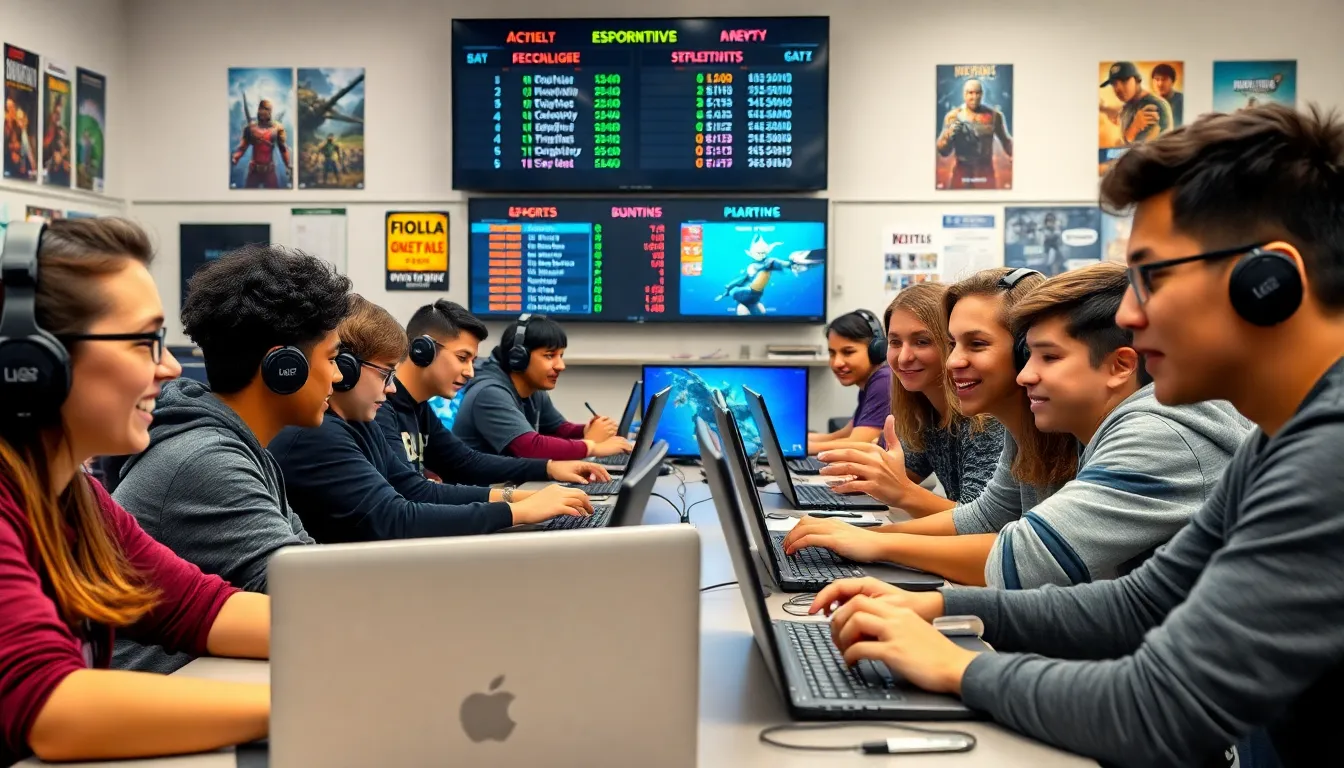In a world where gaming isn’t just for couch potatoes anymore, esports is making waves in education like a rogue wave at a beach party. Schools are trading in traditional sports for virtual arenas, proving that gaming can be more than just a guilty pleasure. With students glued to their screens, it’s time to embrace the joystick revolution and unlock the potential of esports in the classroom.
Table of Contents
ToggleOverview of Esports in Education
Esports are becoming an integral part of educational settings. Schools nationwide increasingly host esports teams, facilitating competitive play while combining technology with teamwork. Research shows that participation in esports can enhance students’ engagement in learning and foster important skills like collaboration and strategic thinking.
Various institutions now offer esports programs, emphasizing inclusivity and accessibility. Students with diverse backgrounds find a sense of belonging within these teams, contributing to increased social interaction and community building. Moreover, schools often align esports with academic goals, supporting STEM initiatives through programming and game design courses.
Data indicates that around 25% of high schools now have esports programs. This number rises as awareness grows regarding the developmental benefits connected to gaming. Engaging in esports can improve critical thinking and problem-solving abilities, qualities that hold value in various career paths.
Institutions report academic improvements among students involved in esports. Enhanced focus and time management skills often result from balancing game commitments with academic responsibilities. Furthermore, increased interest in pursuing careers within the gaming industry has led many universities to create scholarships for aspiring esports athletes.
Incorporating esports into educational environments encourages innovative teaching methods. Educators leverage gaming to create interactive learning experiences, thereby increasing classroom participation. As a result, students gain hands-on experience relevant to both academic and professional spheres.
Benefits of Esports in Education

Esports offer significant advantages within educational settings, enhancing both student engagement and skill development. As more schools adopt esports programs, they create opportunities for students to thrive academically and socially.
Enhancing Student Engagement
Esports provide a unique platform for student engagement. Many students who might struggle in traditional educational environments find motivation through competitive gaming. Increased participation in esports fosters enthusiasm for school activities, making attendance more appealing. Educators report that by incorporating gaming elements into lessons, they capture students’ attention and stimulate interest in learning. Activities centered around esports encourage collaboration and camaraderie among peers, bridging gaps between different student groups. Engaged students tend to perform better academically, underscoring the importance of integrating esports into the curriculum.
Development of Critical Skills
Participation in esports cultivates essential skills relevant to various fields. Through team-based gameplay, students learn collaboration, communication, and strategic thinking. These skills transfer directly into real-world situations, preparing students for future challenges. Exposure to competitive environments encourages players to develop problem-solving abilities while adapting to rapidly changing scenarios. Students also gain valuable experience in time management, as balancing gaming commitments with academic responsibilities is crucial. Research indicates that these skills enhance critical thinking, significantly impacting academic performance and overall personal development.
Challenges and Concerns
Esports in education presents several challenges that educators must navigate. Stereotypes surrounding gaming often hinder acceptance in academic settings.
Addressing Stereotypes
Many individuals perceive gamers as socially isolated or lacking focus. This misconception can discourage schools from embracing esports programs. It’s crucial to highlight the team-building and communication skills developed through competitive play. Programs can showcase diverse student participation, emphasizing gaming as a collaborative experience rather than an individual pursuit. Educators play a key role in reshaping these narratives by promoting the positive aspects of esports, showcasing benefits like improved academic performance and increased engagement among various student demographics.
Balancing Screen Time
Managing screen time poses another concern for educational institutions. While esports provide engaging learning experiences, excessive gaming can lead to negative health effects. Establishing guidelines around gameplay schedules is essential for maintaining a healthy balance. Incorporating breaks during tournaments and promoting physical activity can help mitigate potential risks. Students must learn to prioritize their responsibilities, integrating gaming as part of a well-rounded lifestyle that includes studying and offline activities. These strategies ensure that esports enrich rather than detract from students’ educational experiences.
Successful Esports Programs
Schools across the nation report increasing success with innovative esports programs. Engaging students in competitive gaming fosters skill development and enhances school spirit.
Case Studies from Schools
Many high schools reported significant improvements in student engagement after launching esports teams. In one instance, a California school district saw a 40% increase in attendance among students who participated in esports. Other institutions, like Lancaster High School in Texas, managed to create a fully funded esports program, attracting diverse participants and enabling equal opportunities for all students. Efforts like these emphasize the positive impact of inclusive gaming environments on academic performance.
Partnership with Organizations
Collaborations with organizations such as the National Association of Esports Coaches and Directors (NAECD) have bolstered esports initiatives. These partnerships provide essential resources, training, and funding that help schools establish robust programs. For instance, some universities are now offering scholarships specifically for esports athletes, empowering students to pursue gaming at a collegiate level. Engaging partnerships support schools in creating sustainable esports ecosystems, allowing for continuous growth and development in educational settings.
Future of Esports in Education
Esports in education continues to evolve rapidly, with schools increasingly integrating competitive gaming into their curricula. Trends indicate that nearly 25% of high schools now have esports programs, a figure projected to rise as awareness of their benefits grows. Research demonstrates that participation enhances student engagement, promoting important skills like collaboration and critical thinking.
Innovative teaching methods based on gaming are emerging, enabling educators to create interactive learning experiences. Through esports, students enjoy hands-on opportunities that connect academic knowledge with real-world applications. The presence of esports teams fosters community, as students from diverse backgrounds participate and support one another.
Concerns regarding stereotypes and misconceptions about gamers persist. Educators play a vital role in reshaping the narrative by emphasizing how esports build team spirit and communication skills. These programs demonstrate that gaming cultivates a sense of belonging, thus improving social interactions among students.
Screen time remains a critical issue. Establishing clear guidelines for gaming during school hours helps students maintain a healthy balance between academics and esports. Promoting physical activity alongside gaming ensures students engage in well-rounded lifestyles, avoiding potential health risks.
Successful case studies highlight the benefits of esports programs. One California school district reported a 40% increase in attendance among esports participants, showcasing the positive impact on student engagement. Schools like Lancaster High School in Texas have developed programs that attract diverse participants and advocate inclusivity.
Esports grant students pathways to higher education through scholarships, encouraging the pursuit of gaming careers. The future holds exciting possibilities as more institutions prioritize esports in education, fostering skill development and enhancing overall student experiences.
Esports in education is reshaping the landscape of student engagement and skill development. By embracing competitive gaming, schools are not only enhancing academic performance but also fostering a sense of community among students. The integration of esports cultivates essential life skills such as collaboration and critical thinking, preparing students for future challenges.
As educational institutions continue to recognize the benefits of esports, the trend towards inclusive and innovative learning environments will likely expand. This movement not only addresses the stereotypes surrounding gaming but also highlights its potential to motivate and inspire students from diverse backgrounds. The future of esports in education is bright, promising to create enriching experiences that resonate far beyond the classroom.

